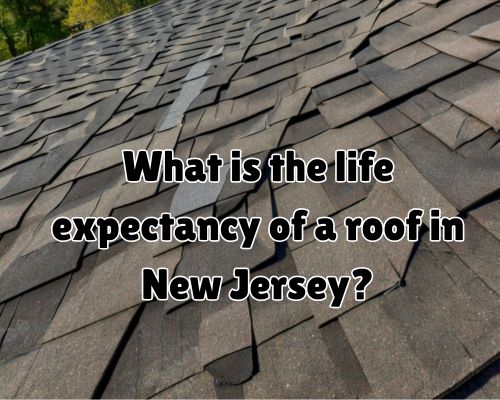For homeowners in the Garden State, the question “What is the life expectancy of a roof in New Jersey?” isn’t just practical—it’s essential. With the state’s mix of humid summers, icy winters, salty coastal winds, and dense suburban tree cover, roofs in New Jersey endure some of the most unpredictable weather in the northeastern United States.

Understanding how long a roof should last—and the variables that affect that lifespan—is key to budgeting for maintenance, anticipating repairs, and protecting your biggest investment: your home.
The Short Answer: Roof Lifespan by Material in NJ
Here’s a general breakdown of average roof lifespans in New Jersey, based on roofing materials commonly used in residential homes:
| Roofing Material | Life Expectancy in NJ |
|---|---|
| Asphalt Shingles | 15–30 years |
| Architectural Shingles | 25–40 years |
| Wood Shakes | 20–35 years |
| Metal Roofing | 40–70 years |
| Clay/Concrete Tiles | 50+ years |
| Slate Roofing | 75–100 years |
| Flat Roofs (EPDM/TPO) | 20–30 years |
Keep in mind, these are ballpark figures. Local climate, roof pitch, ventilation, and installation quality heavily influence longevity.
Climate Considerations Unique to New Jersey
Roofing systems in New Jersey, especially areas like Monmouth County, Bergen County, and Ocean City, must be built to handle:
- Nor’easters and snow loads: Heavy snow and ice can strain or damage shingles and flashing. Freeze-thaw cycles also cause deterioration over time.
- Summer humidity: Mold and algae—especially Gloeocapsa magma—thrive on poorly ventilated roofs in areas like Trenton, New Brunswick, or Cherry Hill.
- Coastal exposure: Homes along the Jersey Shore, like in Atlantic City or Cape May, need roofing that resists salt air corrosion, particularly metal roofing.
- Tree debris in suburban areas: Towns like Westfield or Princeton often have mature tree canopies that drop branches and leaves, accelerating wear and tear through abrasion and moisture retention.
The life expectancy of a roof in New Jersey depends on how well it’s built to withstand these local environmental challenges.
The Role of Roofing Installation and Craftsmanship
Even the best roofing materials can fail early if improperly installed. This is why it’s essential to choose a certified local roofing contractor—preferably one with verifiable experience in New Jersey’s building codes and permit requirements.
Ask these questions before hiring:
- Are they GAF Master Elite or CertainTeed certified?
- Do they understand New Jersey-specific regulations (like ice dam protection zones)?
- Can they provide local references in Somerset County, Essex, or Hudson County?
Proper underlayment, flashing, ventilation, and fastener use will all directly impact the roof’s durability over decades.
Maintenance: A Key Factor in Roof Longevity
Another element that heavily affects your roof’s lifespan in New Jersey is routine maintenance. Homeowners who perform semi-annual roof inspections (especially after storms) tend to extend their roof’s life significantly.
Common maintenance steps include:
- Gutter cleaning (especially in leafy areas like Morristown or Short Hills)
- Removing moss and algae buildup (which eats at asphalt granules)
- Replacing lifted or curling shingles
- Sealing flashing around chimneys and skylights
- Clearing overhanging branches to reduce limb fall and debris accumulation
Don’t forget to inspect your attic. Poor attic ventilation causes heat buildup, moisture condensation, and premature shingle breakdown—especially in older homes in Hoboken, Newark, or Paterson.
How Do You Know When It’s Time to Replace?
Whether you own a colonial in Ridgewood, a modern home in Edison, or a beachfront property in Toms River, here are the signs your roof may be nearing its end:
- Curled or missing shingles
- Excessive granule loss
- Leaks or water stains in your attic
- Sagging roofline or soft spots
- Visible mold or algae streaks
Most insurance companies—and many roofing contractor in New Jersey—recommend replacing a roof between 80-90% of its expected lifespan to avoid costly interior damage.
Roof Replacement Costs in NJ (Quick Overview)
Understanding life expectancy naturally leads to considering costs. Here’s a rough breakdown of average replacement costs in New Jersey by material:
| Roof Type | Cost per Square Foot | Avg. Cost (2,000 sq ft) |
|---|---|---|
| Asphalt Shingles | $3.50 – $6.00 | $7,000 – $12,000 |
| Metal Roofing | $7.00 – $14.00 | $14,000 – $28,000 |
| Slate or Tile | $10.00 – $25.00 | $20,000 – $50,000+ |
These prices reflect averages from contractors across Central Jersey, South Jersey, and North Jersey in 2025, including areas like Hamilton Township, Parsippany, and Freehold. Roofs on historic homes or those requiring structural upgrades may cost more.
Ways to Extend Roof Life in New Jersey
If you’re looking to maximize your roof’s lifespan, consider these tips:
- Use algae-resistant shingles: Many NJ roofers recommend AR-rated shingles with copper granules to prevent black streaks.
- Install proper attic insulation and ridge vents: To prevent ice dams and summer heat buildup.
- Trim trees regularly: Especially important in towns like Montclair or Summit with dense foliage.
- Schedule annual roof inspections: Local roofing pros in NJ often offer low-cost or free inspections.
- Apply roof coatings: Especially for flat roofs in multi-family buildings in urban zones like Jersey City or Elizabeth.
Final Thoughts: Don’t Wait Until It Leaks
So, what is the life expectancy of a roof in New Jersey?
It depends—but knowledge and maintenance are power.
In general, a well-installed asphalt shingle roof in New Jersey should last 20–30 years, while a metal or slate roof could last 50 years or more. However, the diverse weather across counties—from coastal storms in Ocean County to snow loads in Sussex County—means homeowners must be proactive.
By choosing quality materials, hiring skilled local roofers, and investing in regular maintenance, homeowners across New Jersey—from Camden to Clifton—can ensure their roof lives a long, leak-free life.